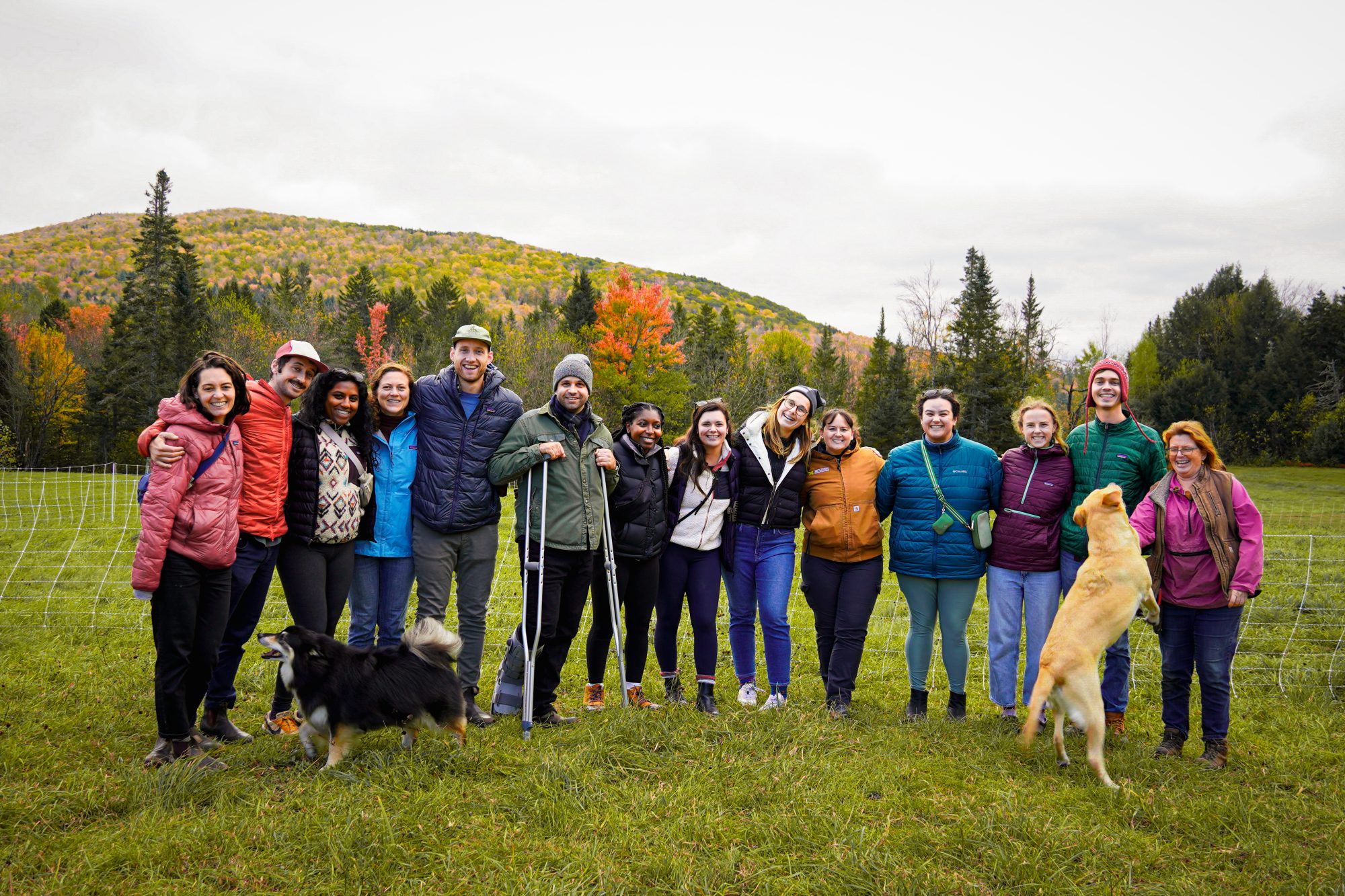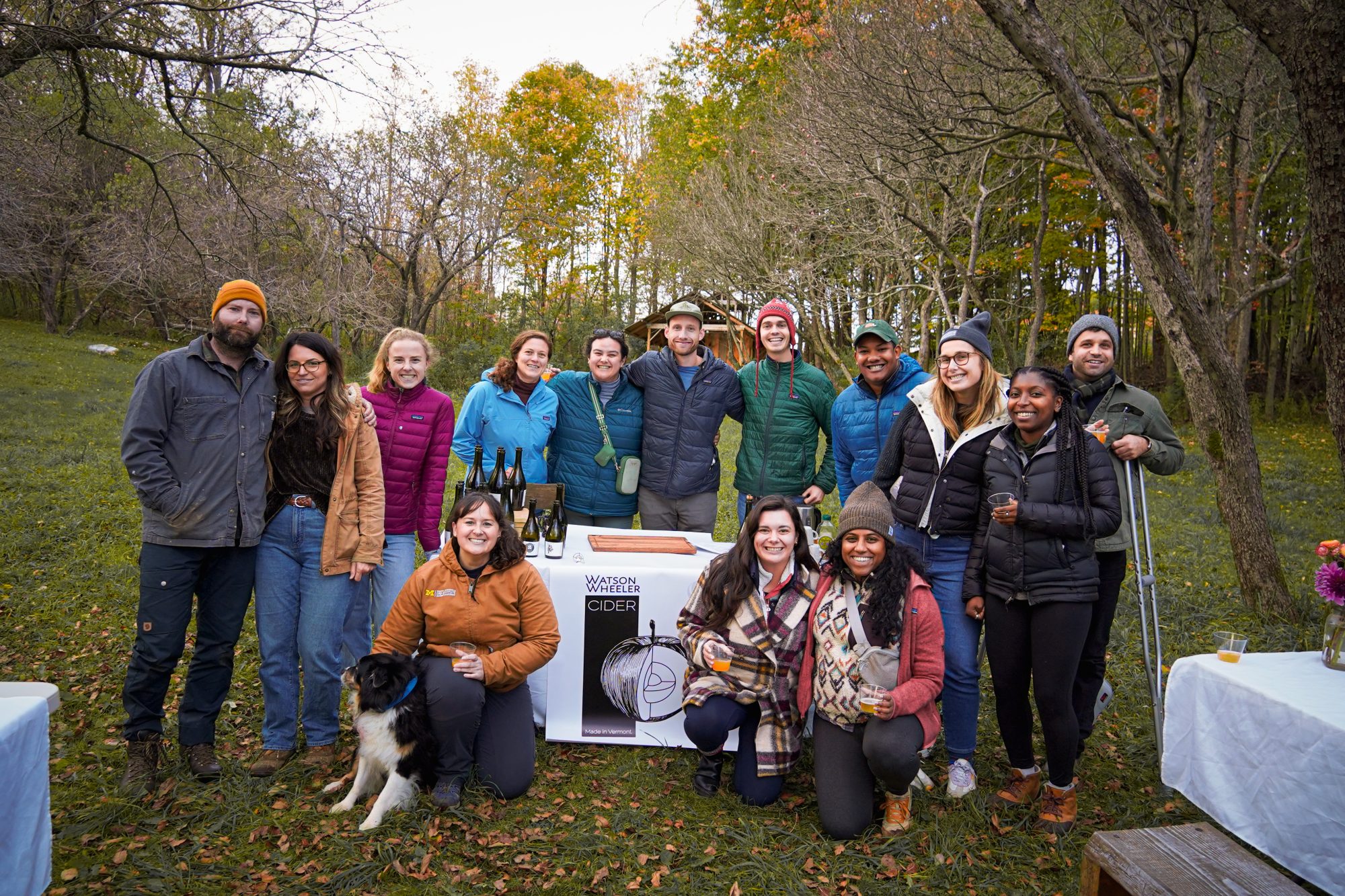Student Impact Project
vErbmont: New perspectives on sustainability challenges
An unwritten tradition for third-year Erb students is the whole class coming together for a trip during fall break to celebrate the journey we’ve been on. Previous classes have ventured up north to Michigan’s Upper Peninsula and to the Great Smoky Mountains of Tennessee. This year, we had the opportunity to explore the beauty that is Southern Vermont and to meet the incredibly generous people who call it home.

Third-year Erber Eli Forrester is on the board of a local nonprofit, New Highland House, which graciously let us stay at their property in the town of Londonderry. We visited local farms, orchards, and creameries and brought back ingredients to prepare fresh meals together on the property.
During our visits, we sat down with our hosts and learned about the particular business and sustainability challenges they were facing, which included scaling up operations while staying true to their values and transitioning the business from one generation to another. Along the way, we heard the stories of multigenerational families of farmers and those who were moved by the beginnings of the environmental movement in the 1970s to “return to the land” and create a more sustainable food system. While every story or “why” was unique, a few interesting trends and themes emerged:
- Working the land is hard. While romantic notions of living off the land and growing your own food are common, the fact is that the work is difficult to do, and it offers minimal economic payoff. Margins for small farmers have steadily declined over the past few decades, especially for those in the dairy industries that create commodity products. Commitments to certain practices, such as feeding animals a more “natural” diet and refusing to use chemicals in the growing process, comes at a real cost to those making our food, and it cannot always be recouped. Then farmers face incredibly tough decisions, balancing stewardship for the earth and their own families, and families that have farmed for generations may need to change practices or even their business model to stay afloat.
- To compete in this economy, farmers have become increasingly thrifty and creative. New ownership models have emerged with dairy, cheese, egg and apple collectives that allow farmers to pool their resources and bargaining power to demand a fair price and long-term contracts for their products. Direct agreements with large corporations that also focus on food quality and sustainable practices, like Cabot and Ben and Jerry’s, provide reliable revenue streams at prices that reflect the additional effort required. Farmers have also started going direct to consumers through farmers markets, subscription shipping and “wine club” models for wealthy, discerning consumers from major New England cities who are willing to pay more. These shifts have allowed growers to move outside of the low-margin commodities market and into the speciality market that provides year-to-year stability.
- Even with these changes, the future of small-scale, family-owned farming is unsure. Younger generations, seeing the struggle to make ends meet firsthand, are not as interested in keeping the family business going. The original allure that kept families in rural areas, away from the craziness of urban life, is seen as a detriment for a generation that wants to be connected. It means long days with no formal hours and rare vacations. One cheesemaker we spoke with is going on his first weeklong vacation in decades, possible only because he is winding down the business. Some do want to stay and continue the tradition, but the numbers look difficult, considering rising raw material and labor costs, competition from a global market of suppliers, and difficulty in differentiating your products. This is happening within the larger trend of people leaving expensive cities that their remote jobs don’t require them to be in and buying up former farms or plots of land for their first, second, or third homes. The next generation of potential farmers my age are being priced out of the land they grew up on as a new eco/agro tourism economy begins to take shape, with weekenders and seasonal dwellers looking for an “authentic” experience. The irony was not lost on us that we, as business school students, are part of this larger trend, too.

Vermont and vast swaths of rural America are going through a major transformation that was fascinating to see firsthand. It’s being defined by all the buzzwords we hear daily in class: globalism, free markets, climate change and stakeholder capitalism. As students who are concerned about sustainability and who recognize the vast power of the private sector and public markets to enact change, I hope we continue to take the lessons we learned from this trip into our careers and remember the land, animals and people who make modern life possible.